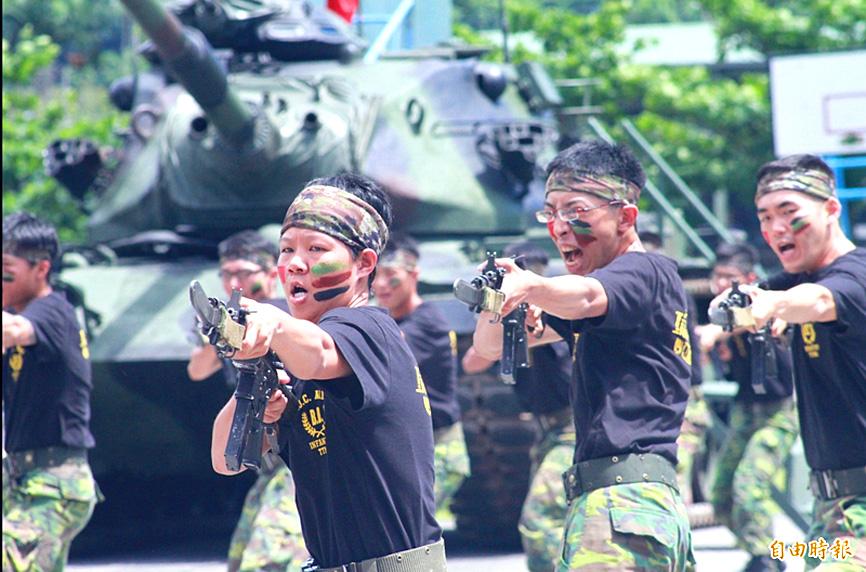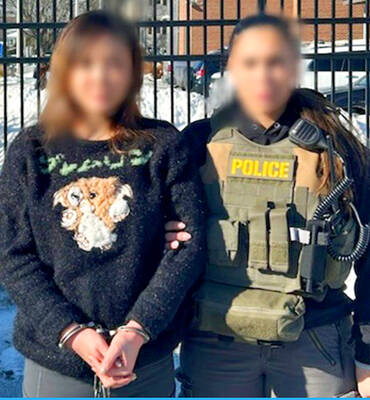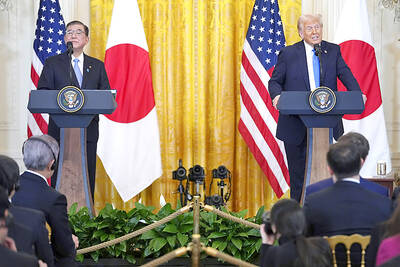Staff reporters, with staff writer
Bayonet drills are an essential part of the army’s training curriculum, Minister of National Defense Chiu Kuo-cheng (邱國正) said on Monday as he defended a policy of the army’s top general to increase bayonet drills in training programs.
At a meeting of the legislature’s Foreign Affairs and National Defense Committee, Democratic Progressive Party Legislator Tsai Shih-ying (蔡適應) questioned the usefulness of the drills.

Photo: Chen Hsien-yi, Taipei Times
Army General Hsu Yen-pu (徐衍璞) has introduced physical standards and combat skills-related policy changes since he assumed command of the service in July.
Tsai asked Chiu if he agrees with the army’s renewed interest in bayonets and to explain how bayonet training is being conducted.
Citing the US Army’s decision to discontinue bayonet drills in 2010, Tsai said that Taiwan’s army should consider prioritizing physical fitness programs — including weight training, calisthenics, running and marches — over proficiency with the bayonet.
Chiu said that he agrees with Hsu’s bayonet training policy, adding that the drills build up the mental and physical conditioning of soldiers.
These aspects are core components of the army’s training, alongside other elements such as technical proficiency and command skills, he said.
Bayonet drills are incorporated into the training curriculum, while the unit that conducts the training adjusts the intensiveness depending whether it is for a combat or support element, he said.
Army Chief of Staff Lieutenant General Chang Yuan-hsun (章元勳) said that bayonet drills are carried out within the time allotted to units for training.
A retired general who requested anonymity on Thursday said that public interest in the bayonet policy is evidence that the nation is paying attention to the threat from China.
However, most comments on the issue have been “uninformed,” the retired general said.
In Taiwan’s armed forces, bayonet fighting is practiced as a martial art that revolves around the use of the weapon when it is affixed to a rifle to rapidly defeat an enemy at close quarters, they said.
“The army’s emphasis on bayonet skills has nothing to do with human wave tactics,” they said.
The bayonet fulfills a particular set of requirements in close combat and most of the world’s militaries continue to issue bayonets as a standard infantry weapon, they said, adding that bayonet-bearing troops are frequently seen in recent combat photography.
Fixing bayonets is effective in the assault or defense of a position and escorting prisoners of war, and helps soldiers to retain their rifles when fighting at grappling range, they said.
“Bayonet drills are necessary for the individual soldier to wield the weapon effectively to complete their mission,” they said. “The armed forces would be remiss if it issued bayonets ... without providing instruction in the use of the weapon.”

Johanne Liou (劉喬安), a Taiwanese woman who shot to unwanted fame during the Sunflower movement protests in 2014, was arrested in Boston last month amid US President Donald Trump’s crackdown on illegal immigrants, the Criminal Investigation Bureau (CIB) said yesterday. The arrest of Liou was first made public on the official Web site of US Immigration and Customs Enforcement (ICE) on Tuesday. ICE said Liou was apprehended for overstaying her visa. The Boston Field Office’s Enforcement and Removal Operations (ERO) had arrested Liou, a “fugitive, criminal alien wanted for embezzlement, fraud and drug crimes in Taiwan,” ICE said. Liou was taken into custody

The US-Japan joint statement released on Friday not mentioning the “one China” policy might be a sign that US President Donald Trump intends to decouple US-China relations from Taiwan, a Taiwanese academic said. Following Trump’s meeting with Japanese Prime Minister Shigeru Ishiba on Friday, the US and Japan issued a joint statement where they reaffirmed the importance of peace and stability in the Taiwan Strait and support for Taiwan’s meaningful participation in international organizations. Trump has not personally brought up the “one China” policy in more than a year, National Taiwan University Department of Political Science Associate Professor Chen Shih-min (陳世民)

‘NEVER!’ Taiwan FactCheck Center said it had only received donations from the Open Society Foundations, which supports nonprofits that promote democratic values Taiwan FactCheck Center (TFC) has never received any donation from the US Agency for International Development (USAID), a cofounder of the organization wrote on his Facebook page on Sunday. The Taipei-based organization was established in 2018 by Taiwan Media Watch Foundation and the Association of Quality Journalism to monitor and verify news and information accuracy. It was officially registered as a foundation in 2021. National Chung Cheng University communications professor Lo Shih-hung (羅世宏), a cofounder and chairman of TFC, was responding to online rumors that the TFC receives funding from the US government’s humanitarian assistance agency via the Open Society Foundations (OSF),

ANNUAL LIGHT SHOW: The lanterns are exhibited near Taoyuan’s high-speed rail station and around the Taoyuan Sports Park Station of the airport MRT line More than 400 lanterns are to be on display at the annual Taiwan Lantern Festival, which officially starts in Taoyuan today. The city is hosting the festival for the second time — the first time was in 2016. The Tourism Administration held a rehearsal of the festival last night. Chunghwa Telecom donated the main lantern of the festival to the Taoyuan City Government. The lanterns are exhibited in two main areas: near the high-speed rail (HSR) station in Taoyuan, which is at the A18 station of the Taoyuan Airport MRT, and around the Taoyuan Sports Park Station of the MRT